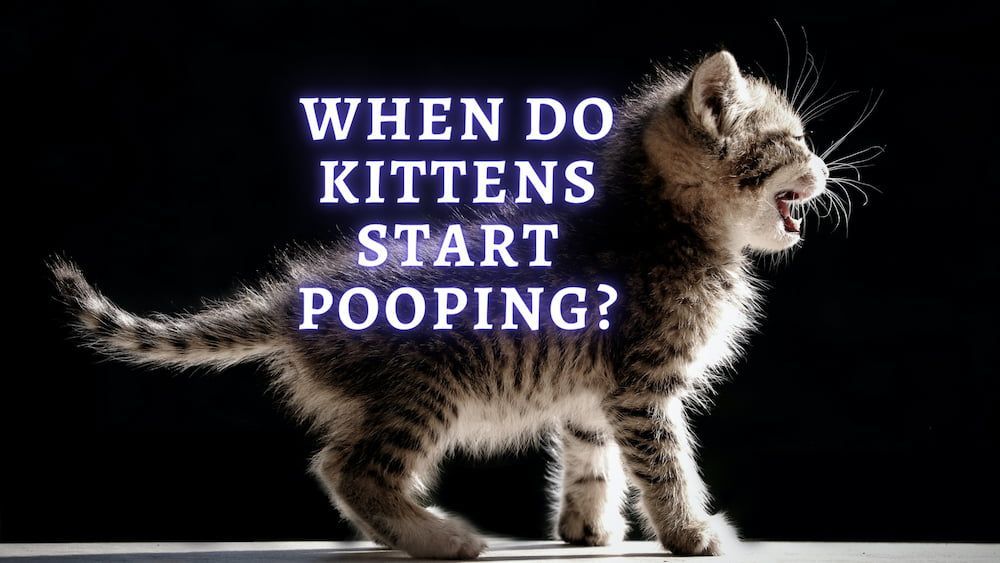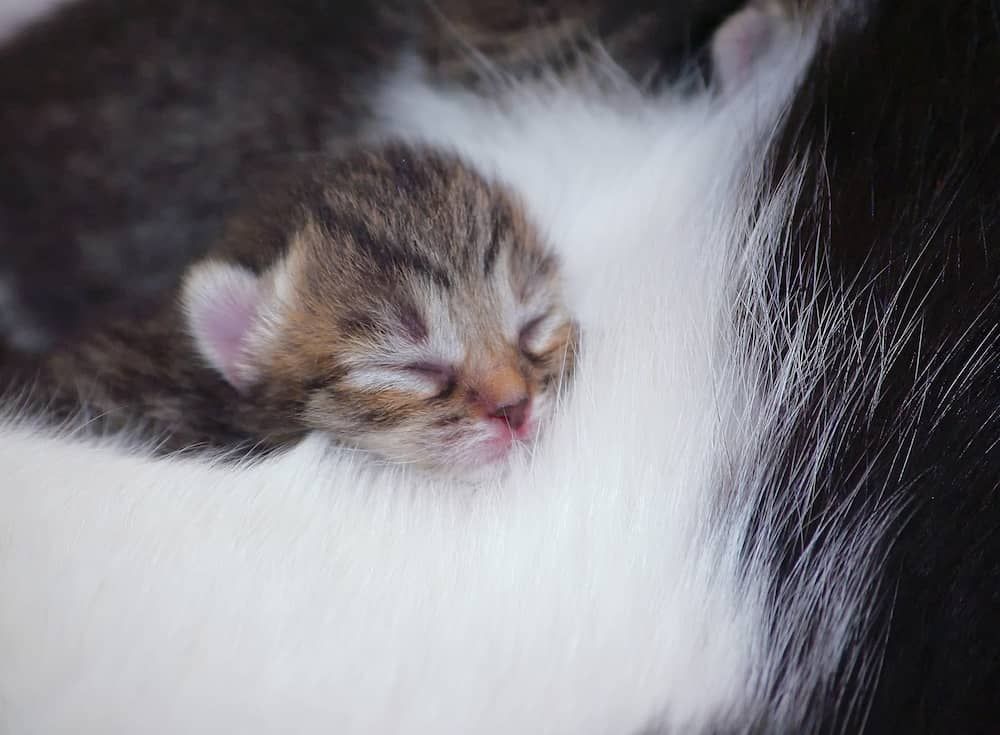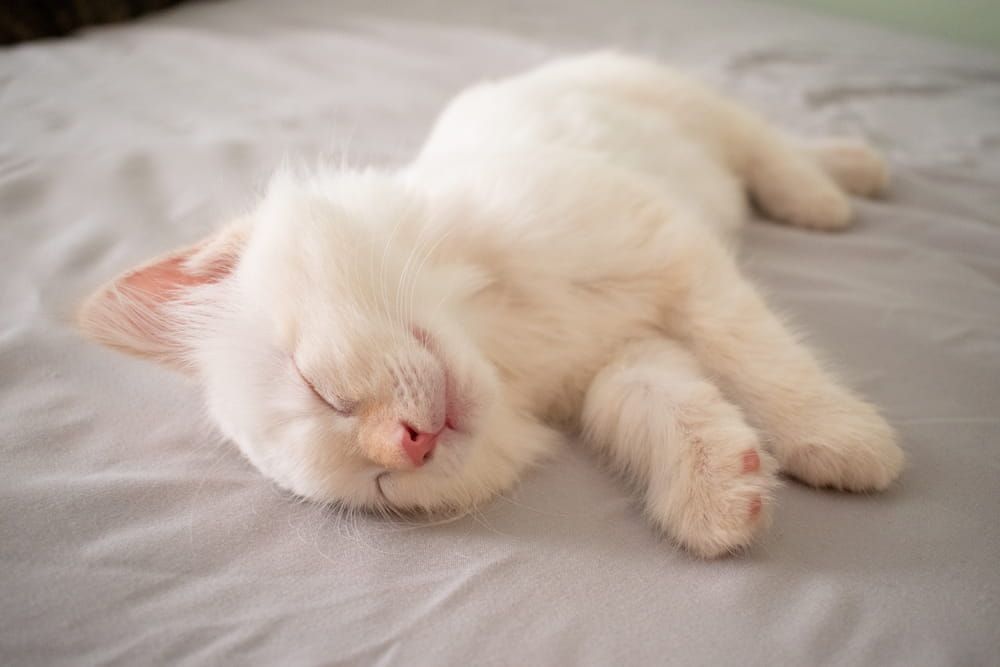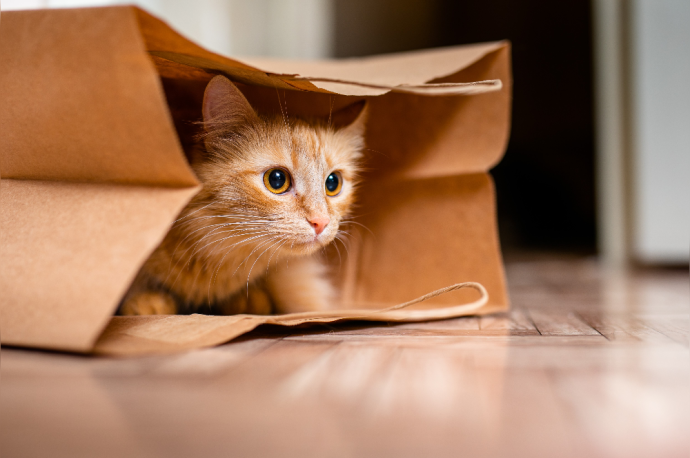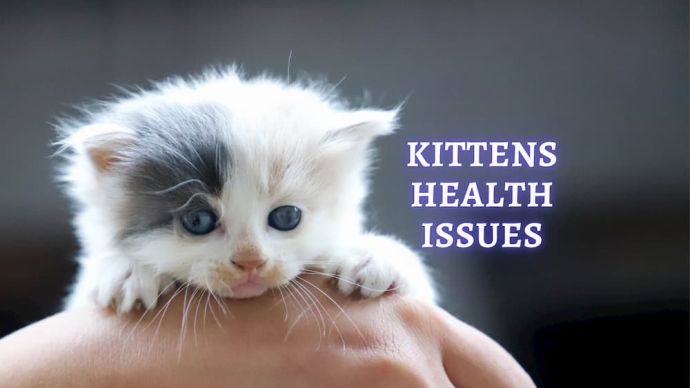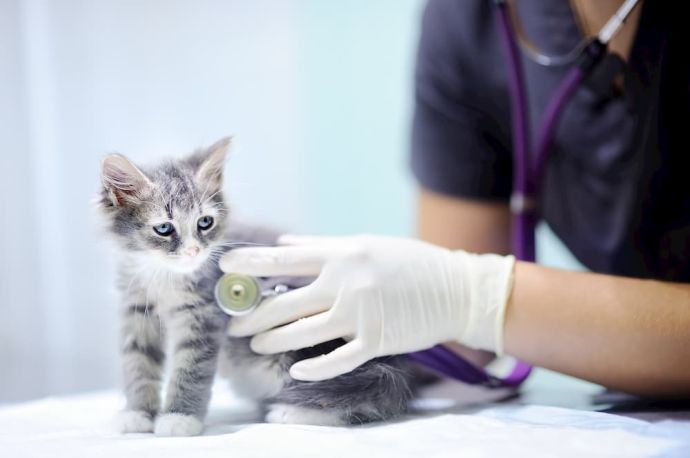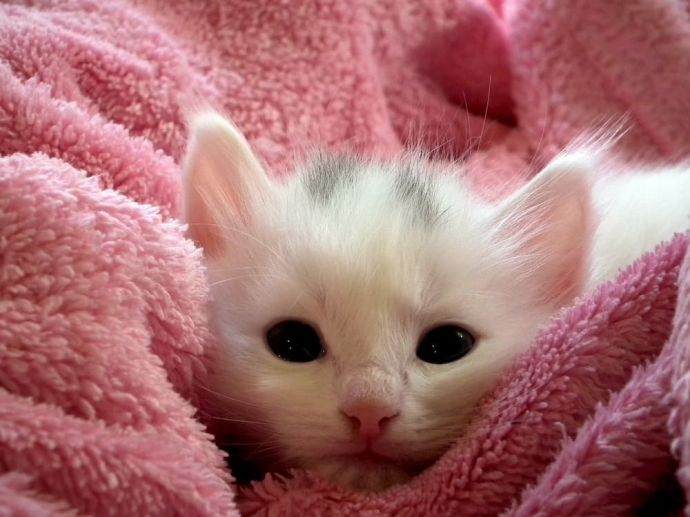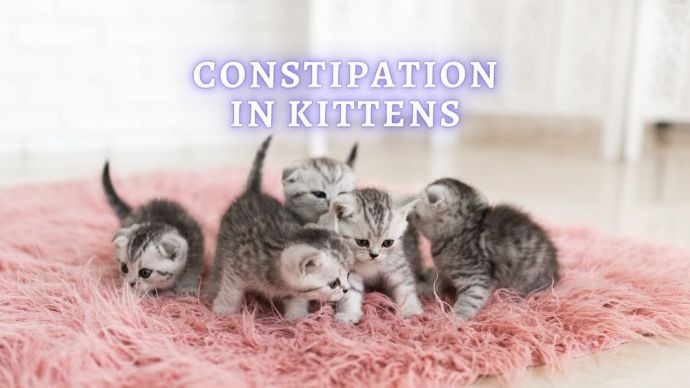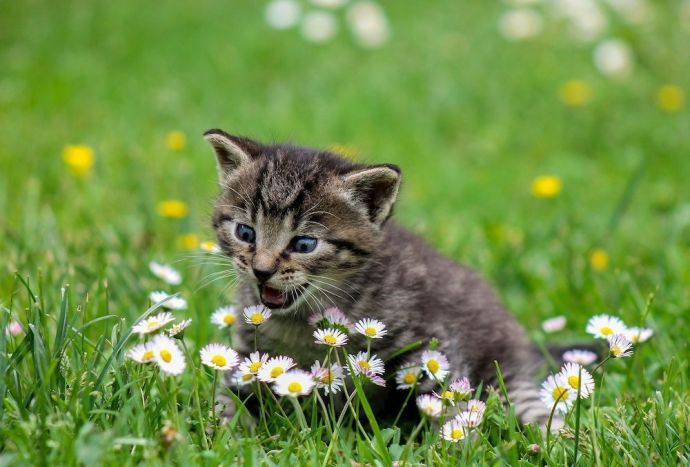When Do Kittens Start Pooping? Vet Advice
Written by:
Author: Carol Young
Carol has worked in specialty, emergency, mixed animal and general veterinary practices, and enjoys all aspects of veterinary medicine. Her special areas of interest include anesthesia, critical care, emergency, dentistry, internal medicine and small animal nutrition.
View all 62 articlesLearn about our editorial process and veterinary review board.
Viewed: 4340
Updated on: 05/18/2022
If you are a cat-owner, you may have wondered about when kittens start pooping, especially when they start doing it on their own. Kittens are adorably cute and fluffy, and an important part of your young fluffball’s health includes following a consistent deworming and vaccine schedule and making sure your youngster has a proper diet and regular bathroom habits. Part of this involves monitoring your cat’s litterbox behavior, and often your kitten is pooping.
When Exactly Kittens Start Pooping?
So when do kittens start pooping? Newborn cats depend upon their mothers for just about everything, including help in elimination. In addition to nursing and bathing her kittens, a mother also uses grooming to stimulate her youngsters to defecate and urinate. Newborn cat can’t eliminate on their own without mother cat help, and it usually takes 3 ‘weeks until a kitten can defecate on it’s own. Typically the mother will nurse a kitten, then after the meal, groom them to stimulate pooping.
Mama cat stimulates pooping by licking the kitten’s rear-ends, and if you are fostering a newborn cat, you may need to take the role of mother and use a warm washcloth to wipe down the kitten’s bottom until he defecates and urinates. It’s important to keep your little one clean and follow good hygiene habits.
When a cat reaches the age of 3-4 weeks old, he can start to poop on his own without stimulation from the mother. At this time, the kitten’s eyes are open, he is starting to explore his world, and he can start eating some soft food and kibble in addition to nursing.
How Can I Make A Kitten Poop?
If you notice that your kitten is constipated or is unable to poop. Contact your vet immediately to rule out any medical issues. You can also help relieve your young one by using a warm washcloth or cotton ball and gently rubbing around your kitten’s genitals, abdomen, and bottom. You can gently work the washcloth/cotton ball in small circles, to help relax and stimulate them to poop. Continue for several minutes, continuing to massage gently in circles until your cat defecates. If there is a success, clean up afterward with a clean washcloth and warm water. You may have to do this after each feeding until the kitten can defecate on its own.
How Often Do Kittens Poop?
Just like many young mammals, very young cat will urinate and defecate after each meal. If you feed your kitten several times a day, he may poop after eating. As a kitten grows and matures, he will not necessarily poop after every meal, and the frequency will decrease over time.
As the kitten’s gastrointestinal system grows and develops, he may only poop once or twice a day, however, this depends on the kitten’s diet. As a cat owner, it’s a good idea to keep an eye on your kitten’s litterbox habits, making sure that the stools are well-formed and consistent. If you have any concerns, you can always contact your veterinarian.
By 4 weeks old, he will try to shift to using the litterbox and use it independently. Cats are denning creatures and naturally will gravitate to using the litterbox. At 4 weeks and older, the average kitten typically excretes one or two times a day, and if the cat is nursing or bottle-fed, his stools should be well-formed, business, and will look brown or yellow. Kittens who are older than 4 weeks and eating solid food may exhibit darker-brown and more formed poops.
READ MORE: How to Teach a Kitten to Use a Litter Box
What About Diarrhea?
Kittens may often have diarrhea, and if your notice especially loose or watery stools, it may be due to several things. For example, parasites and bacterial infections can cause diarrhea, and that is why a veterinary check-up and deworming are important. Diarrhea can also be caused by changes in the diet if you switch foods abruptly and offer cow’s milk. Cow’s milk is difficult for them to digest, and can cause some gastrointestinal upset. Stress or changes in the household can also cause diarrhea in cat.
If your kitty has diarrhea that is not resolved within a day or two, contact a veterinarian. Diarrhea can cause dehydration and can be a medical emergency in young cat. It is vital to your kitten’s well-being to make sure he has a complete veterinary physical exam and is on a proper diet that meets his nutritional needs. Diarrhea can also signify that your kitty is not absorbing nutrients properly, which can affect his overall growth and development.
What About Constipation?
On the flip side, you may notice that your pet may not be pooping as often as you would expect. If you haven’t seen your kitten defecate in a couple of days, contact vet to rule out an obstruction or some other medical cause. Do not try to attempt an enema or treat constipation by yourself: Leave treatment to veterinarians. Although it’s rare that kitties get constipated, it can happen.
READ MORE: Vet Advice on Kitten Constipation
What Should Kitten Poop Look Like?
Kitten poop can come in all sorts of shapes, colors, and sizes, depending on the diet. For 3 weeks old and under, most stools should be brown, or dark yellow and should be fairly firm inconsistency. As they mature, their poops may be a bit darker brown, depending on their diet, the color of dry kibble, or the wet food they are eating. In short, cat poop should be well-formed, brown in color, and not too watery or smelly. If your kitty poop is especially watery, loose, or odiferous, you may want to contact your veterinarian. Your veterinarian may want to do a fecal analysis to rule out parasites, worms, or bacterial infections. Oftentimes, mother cat pass parasites to kittens in the womb, and regular deworming is recommended for the youngsters.
When Will My Kitten Poop On Their Own?
As mentioned above, cat start to defecate on their own at about 4 weeks. At this time their neurological and musculoskeletal development is maturing, and they can eat, poop, and urinate on their own without help from mom or a foster mom. If you have a kitten older than 4 weeks old, and he’s unable to poop on his own, you can help by massaging with a warm washcloth to see if that helps. If you are concerned, consult a vet.
How Do I Clean up my Kitten After A Poop Session?
Part of keeping your young cat healthy and happy is to help keep him clean. And this means cleaning up his rear-end after a poop session. The good news is that you can help by doing the following:
- Start with a warm, wet washcloth, gauze, or cotton ball.
- Wipe gently using circular motions around the anus, genitals, and abdominal region where there is soiled fur and skin. Ensure that you wipe any debris away from the genital area so as not to spread poop particles in this area (this may contribute to a urogenital infection).
- After a wash, you can use a soft, dry towel to dry your kitten’s rear area. Try not to dry too roughly as this can cause skin irritation and a rash.
- Be sure to wash the towels and cloths you have used in a bleach solution to minimize the possibility of cross-contaminating other clothing in the wash.
FAQ
How soon should a newborn kitten poop?
Mother cat helps newborn kittens to poop almost right away after birth and after nursing. When kittens are born, the mom immediately starts grooming them, and in some cases, these kittens may defecate shortly after birth. The important issue is that kittens urinate and defecate after each nursing.
Do newborn kittens poop?
The answer is yes, newborn kittens can poop, and this most often depends on how soon the mother starts grooming her kids. Sometimes they will poop as they pass through the birth canal, which can make a bit of a mess. However, moms are clean machines and instinctively are driven to clean both themselves and their newborns.
How do I know when my kitten needs to poop?
Kittens tend to poop a lot because they nurse and eat several times a day. A sure sign that your kitten needs to poop is when he raises his tail, and the anal sphincter starts to pucker. Production of poop or stool is proof-positive that your youngster had to go.
How often should a 2-week old kitten poop?
The answer to this question depends on how often the kitten nurses. Most kittens will nurse every 2-4 hours, so that means that they will defecate after each session. So, if a 2-week old kitten nurses 8 times a day, he will poop about 8 times a day. That’s a lot of bathroom activity, but moms are always good at cleaning up afterward.
 Kitten Care How Do I Introduce My Cat To A New Kitten? 7 Steps To Introduce Cats to Each Other
Kitten Care How Do I Introduce My Cat To A New Kitten? 7 Steps To Introduce Cats to Each Other - 97
- 0
 Cat Care Why Does My Cat Attack My Legs? 10 Reasons Why and What To Do About It (Vet-Approved Advice)
Cat Care Why Does My Cat Attack My Legs? 10 Reasons Why and What To Do About It (Vet-Approved Advice) - 46013
- 21
 Cat Veterinary Tips Cat Stomach Gurgling: Vet Advice on Why is Your Cat Stomach Gurgling?
Cat Veterinary Tips Cat Stomach Gurgling: Vet Advice on Why is Your Cat Stomach Gurgling? - 36469
- 4
 Cat Veterinary Tips My Cat Lost its Voice: Can Cats get Laryngitis? (Vet Advice)
Cat Veterinary Tips My Cat Lost its Voice: Can Cats get Laryngitis? (Vet Advice) - 23554
- 13









